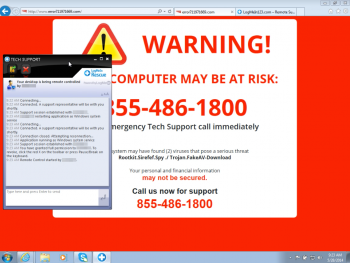What is a tech support scam?
Tech support scammers want you to believe you have a serious problem with your computer. They want you to pay for tech support services you don’t need, to fix a problem that doesn’t exist. They often ask you to pay by wiring money, using a gift card, or a money transfer app. Tech support scammers have two main methods they use to trick people:
Phone Calls
Tech support scammers call and pretend to be a computer technician from a well-known company such as Microsoft, Dell, or Norton. They may even spoof the caller ID so that it displays a legitimate support number from a trusted company. They’ll then ask you to install applications that give them remote access to your computer and pretend to run a diagnostic test. Then they try to make you pay to fix a problem that doesn’t exist.
If you get an unsolicited call claiming there’s a problem with your computer, hang up. Microsoft and Norton have confirmed they will NEVER call you unless you request it. Dell will never call you unless you’re signed up for their enhanced monitoring and support services, but they will never call you unsolicited.
Pop-Ups
Tech support scammers may try to trick you with a pop-up window that appears on your screen. It will look like an error message from your operating system or antivirus software. It might use logos from trusted companies or websites. The message warns of a security issue and tells you to call a toll-free number for help.
Do NOT call the number. Real security messages will never ask you to call a number. Microsoft and Norton have both confirmed that they will NEVER give you a pop-up telling you to call for help. If you get one of these pop-ups, shut down your computer right away.
Additional Tips
If you need to contact Microsoft, Dell, or another well-known company’s support, get the number directly from the official company website.
Never give control of your computer to a third party unless you know it is the representative of a computer support team you contacted.
If you think you’ve been scammed:
- Change ALL of your passwords. Change passwords for your computer, online banking, social media, email, and any other password protected websites that you visit.
- Contact your bank to report that there has been fraud performed on your account.
- File a complaint with the Federal Trade Commission and let the company know. Example: If the scammer was pretending to be from Microsoft, let Microsoft know.
Share:




Leave A Comment